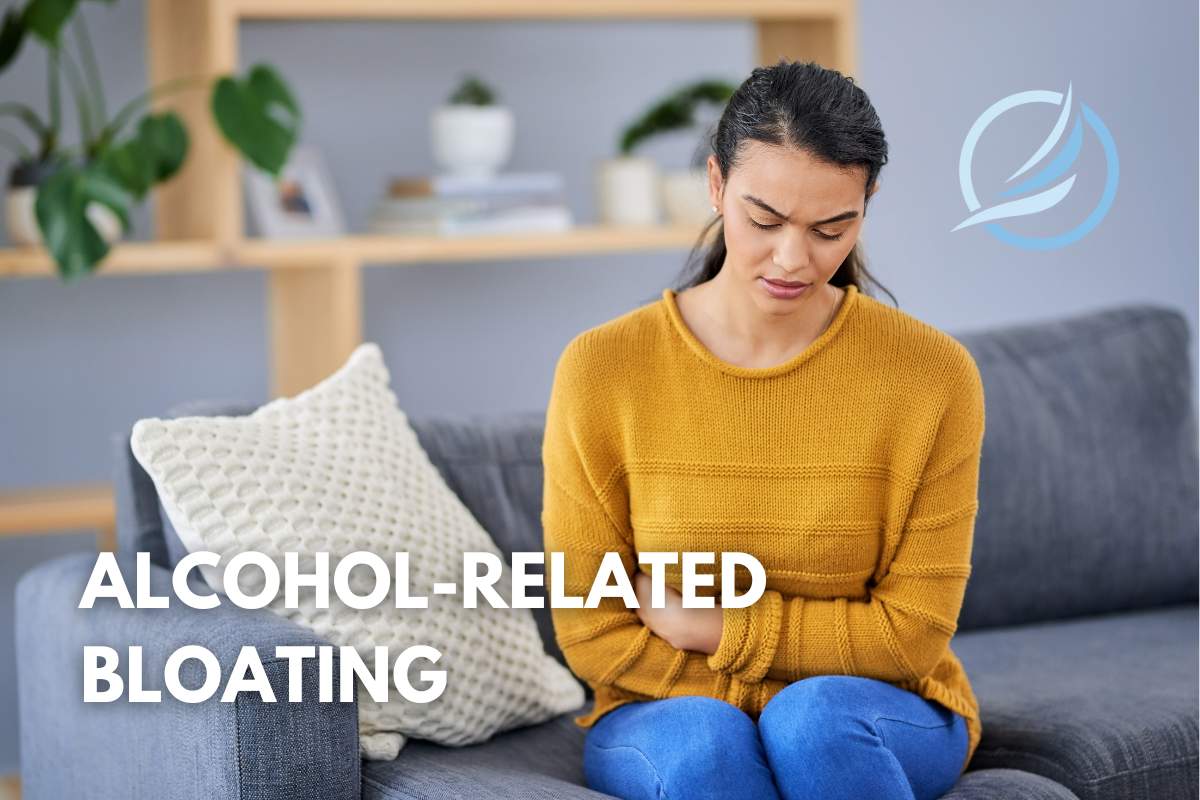Do you ever feel like a night out with friends and drinks always turns into feeling bloated the next day? If you do, you’re not the only one. Alcohol does cause many to feel like they’ve gained weight overnight.
Why? Alcohol damages every organ in the digestive system, from the mouth to the intestines and everything in between. More specifically, it damages the stomach’s protective mucus lining, which protects it from digestive acids.
These acids can cause inflammation or lesions, potentially leading to gastritis (inflammation of the stomach lining), either acute or chronic. Acute gastritis causes short-term bloating, and chronic gastritis may cause long-term bloating.
But how long does this alcohol bloating last, exactly? It depends on several factors. Let’s explore how long it may last and the timeline for how your body recovers when you stop drinking.
How Long Does Alcohol Bloating Last?
Typically, alcohol-related bloating can last from a few hours to a couple of days. Alcohol-related bloating can vary in duration depending on several factors, including the amount of alcohol consumed, individual body reactions, and overall health.
This bloating is caused by alcohol’s effects on the body, including its tendency to cause dehydration, disrupt electrolyte balance, and irritate the gastrointestinal tract.
If a person drinks a large amount of alcohol, the bloating can last longer due to increased gastrointestinal irritation and fluid retention. Additionally, how quickly a person metabolizes alcohol can affect how long the bloating lasts. Eating food, drinking water, and resting can help alleviate bloating faster.
However, if the bloating persists for an extended period or is accompanied by other concerning symptoms, it might be a good idea to consult a healthcare professional, as it could indicate a more serious issue than just the temporary effects of alcohol consumption.
What Happens to Your Body When You Quit Drinking
Here’s a rough timeline of the phases your body goes through when you stop taking alcohol:
- 24 Hours: Withdrawal symptoms may begin within a few hours and can include anxiety, shaking, nausea, and headaches. For heavy drinkers, more severe withdrawal symptoms, such as tremors or seizures, can occur. Sleep disturbances are common, including difficulty falling asleep and staying asleep.
- 48 Hours: Withdrawal symptoms can peak during this time. Some people may experience an increased heart rate, blood pressure, and changes in body temperature. Dehydration and residual effects from drinking might still be present.
- 72 Hours: This is often considered the most challenging period for those with severe alcohol dependency. Symptoms can include continued sleep disturbances, irritability, and, in severe cases, delirium tremens (DTs), which require immediate medical attention.
- 1 Week: Many acute withdrawal symptoms start to subside, though some, like changes in mood and sleep disturbances, may persist. Energy levels may begin to increase, and mental clarity can improve.
- 1-4 Weeks: Sleep patterns may start normalizing, leading to improved mood and cognitive functions. Physical symptoms, like stomach distress and heart rate, usually improve. Liver fat decreases, significantly improving liver health (especially for those with fatty liver disease due to alcohol).
- 1-3 Months: Blood pressure begins to normalize. Improvements in liver function and reduction in liver volume (if enlarged due to alcohol consumption) can be observed. Cardiovascular health improves; the risk of heart disease decreases. Noticeable improvements in mental health; reductions in feelings of depression and anxiety. The immune system starts functioning better.
- 6 Months to 1 Year: Liver fat can decrease by up to 20% after six months, significantly reducing the risk of liver disease. Weight loss and fat reduction due to decreased caloric intake from alcohol significantly improve memory, concentration, and other cognitive functions. Heart health continues to improve, and the risk of heart disease is reduced.
Tips for Managing and Reducing Alcohol-Related Bloating
Managing and reducing alcohol-related bloating involves several strategies, focusing on both immediate relief and long-term changes to prevent recurrence. Here are some tips:
- Stay Hydrated: Alcohol is a diuretic, which means it causes your body to lose fluids and electrolytes, leading to dehydration and bloating. Drink plenty of water before, during, and after drinking alcohol to stay hydrated.
- Eat Before Drinking: Consuming alcohol on an empty stomach can increase its effects and contribute to bloating. Eat a balanced meal with proteins, fats, and complex carbohydrates before drinking to slow the absorption of alcohol.
- Choose Your Drinks Wisely: Some alcoholic beverages, particularly those high in sugars and carbonation (like beer and sweet cocktails), can contribute more to bloating. Opt for drinks that are lower in sugar and carbonation.
- Avoid Salty Snacks: Salty foods can lead to water retention and bloating. Avoid snacks like chips and salted nuts when drinking.
- Limit Carbonated Beverages: In addition to alcoholic beverages, avoid or limit carbonated soft drinks, as they can contribute to gas and bloating.
- Herbal Remedies: Certain herbal teas, such as peppermint, ginger, and chamomile, can aid in digestion and help reduce bloating.
- Avoid Mixing Alcohol Types: Stick to one type of alcohol to reduce the risk of stomach irritation and bloating.
- Check for Allergies or Intolerances: Sometimes, alcohol-related bloating can be a sign of an underlying issue, such as an allergy or intolerance to certain types of alcohol or additives found in alcoholic beverages. Consult with a healthcare provider if you suspect this might be the case.
If you frequently experience bloating after drinking, it may be worth assessing your drinking habits and overall lifestyle.
Long-Term Benefits of Reducing Alcohol Consumption
Quitting drinking can lead to significant positive changes in your body and overall health, especially if alcohol has been consumed heavily or over a long period. Here’s what generally happens:
- Improved Hydration and Skin Health: Alcohol is a diuretic, which means it leads to increased urination and, subsequently, dehydration. When you quit drinking, your body retains more water, improving hydration. This can make your skin look more hydrated and may reduce the appearance of fine lines and wrinkles.
- Better Sleep: Although alcohol might help people fall asleep more quickly, it disrupts the sleep cycle, particularly the rapid eye movement (REM) stage, which is crucial for a restful night. When you stop drinking, your sleep quality can improve, improving energy levels, mood, and cognitive function.
- Weight Loss: Alcoholic beverages are often high in calories and can lead to weight gain. When you quit drinking, you may notice weight loss because you’re consuming fewer empty calories, and your body can better regulate blood sugar and insulin levels.
- Improved Liver Health: Alcohol consumption can lead to fatty liver, hepatitis, and more severe liver diseases. When you stop drinking, you give your liver a chance to recover and repair itself, reducing the risk of liver disease and improving liver function over time.
- Decreased Risk of Cardiovascular Disease: Quitting drinking can lower your blood pressure, reduce your risk of heart disease, and decrease levels of certain fats in the blood (triglycerides), risk factors for heart disease.
- Better Digestive Health: Alcohol can irritate the lining of your stomach and intestines, leading to problems like gastritis and ulcers. When you quit drinking, these symptoms can decrease, and your digestive system can start to heal.
- Enhanced Mental Health: Alcohol misuse is often associated with mental health disorders like depression and anxiety. While quitting drinking may not cure these conditions, many people report feeling more stable, less anxious, and more mentally clear after they stop drinking.
- Improved Immune System: Alcohol can weaken the immune system, making the body more susceptible to infections. After quitting, your body’s immune response improves, making you less likely to get sick.
- Decreased Cancer Risk: Chronic alcohol consumption is linked to an increased risk of several types of cancer, including liver, breast, and colorectal cancer. Quitting drinking can reduce this risk over time.
Alcohol Bloating Can Improve Over Time
Alcohol-related bloating can improve over time, especially if you make specific lifestyle changes and adjust your drinking habits. By decreasing the amount of alcohol you drink or stopping altogether, you can significantly reduce incidents of bloating. Over time, your digestive system can recover from the effects of alcohol, leading to less bloating and other gastrointestinal issues.
If you address these factors and make appropriate lifestyle changes, you should notice a gradual improvement in alcohol-related bloating over time. However, if your symptoms persist or worsen, it’s essential to consult with a healthcare professional to rule out other possible causes and to ensure you receive appropriate treatment and advice.


































